临床实习专业人员在护士教育的学术实践伙伴关系中的关键作用
IF 2.9
3区 医学
Q1 NURSING
引用次数: 0
摘要
临床实习专业人员(CPPs)在护理教育中将学术学习与临床实践经验无缝连接方面发挥着重要作用。本文描述了CPP专业的角色、责任、挑战和建议,并探讨了CPP在不同学科的利用如何在护理和医疗保健系统的学校中具有不同的头衔、团队结构和基本职责。随着护理项目注册人数激增和临床实习仍然稀缺,CPP角色的价值和标准化在增加全国准备充分的护士数量方面变得至关重要。cpp面临着独特的挑战,包括管理复杂的合作伙伴关系,引导技术进步,在面临有限的专业发展机会的同时,解决对临床实习日益增长的需求。建立一个旨在加强临床实习专业的全国性组织,可以为cpp提供一个战略创新、规范实践、倡导资源和与同行建立网络的舞台,最终支持他们的关键工作,并为护理教育的整体改善和熟练护理劳动力的准备做出贡献。本文章由计算机程序翻译,如有差异,请以英文原文为准。
The critical role of clinical placement professionals in academic-practice partnerships for nurse education
Clinical Placement Professionals (CPPs) are instrumental in seamlessly connecting academic learning with practical clinical experiences in nursing education. This paper describes the role, responsibilities, challenges, and recommendations for the CPP profession and explores how the utilization of CPPs across academic disciplines varies significantly, with diverse titles, team structures, and fundamental duties among schools of nursing and healthcare systems. As nursing program enrollments surge and clinical placements remain scarce, the value and standardization of the CPP role become paramount in increasing the number of adequately prepared nurses nationwide. CPPs encounter unique challenges, including managing complex partnerships, navigating technological advancements, and addressing growing demand for clinical placements while facing limited professional development opportunities. The establishment of a nationwide organization aimed at enhancing the clinical placement profession could provide an arena for CPPs to strategically innovate, standardize practices, advocate for resources, and network with peers, ultimately supporting their critical work and contributing to the overall improvement of nursing education and preparation of a skilled nursing workforce.
求助全文
通过发布文献求助,成功后即可免费获取论文全文。
去求助
来源期刊
CiteScore
4.80
自引率
8.00%
发文量
153
审稿时长
52 days
期刊介绍:
The Journal will accept articles that focus on baccalaureate and higher degree nursing education, educational research, policy related to education, and education and practice partnerships. Reports of original work, research, reviews, insightful descriptions, and policy papers focusing on baccalaureate and graduate nursing education will be published.

 求助内容:
求助内容: 应助结果提醒方式:
应助结果提醒方式:


